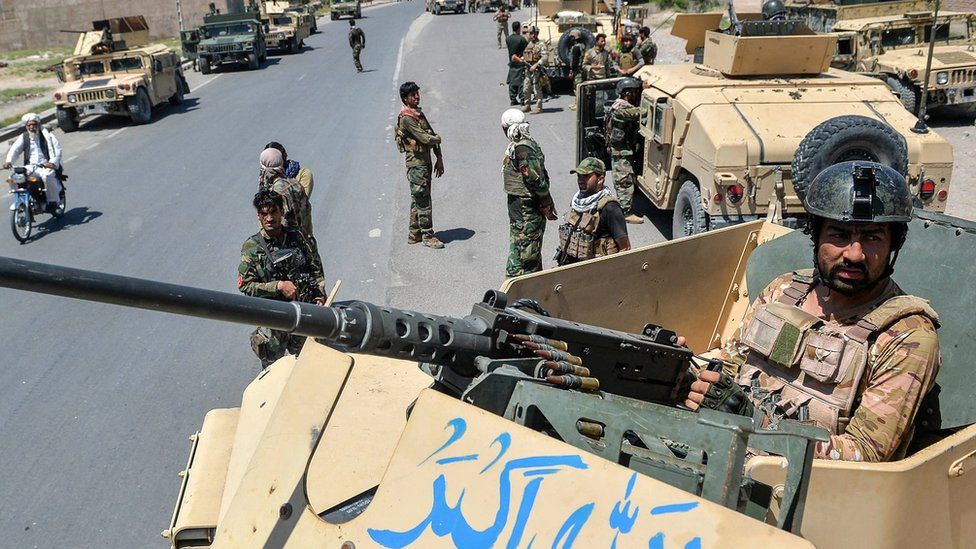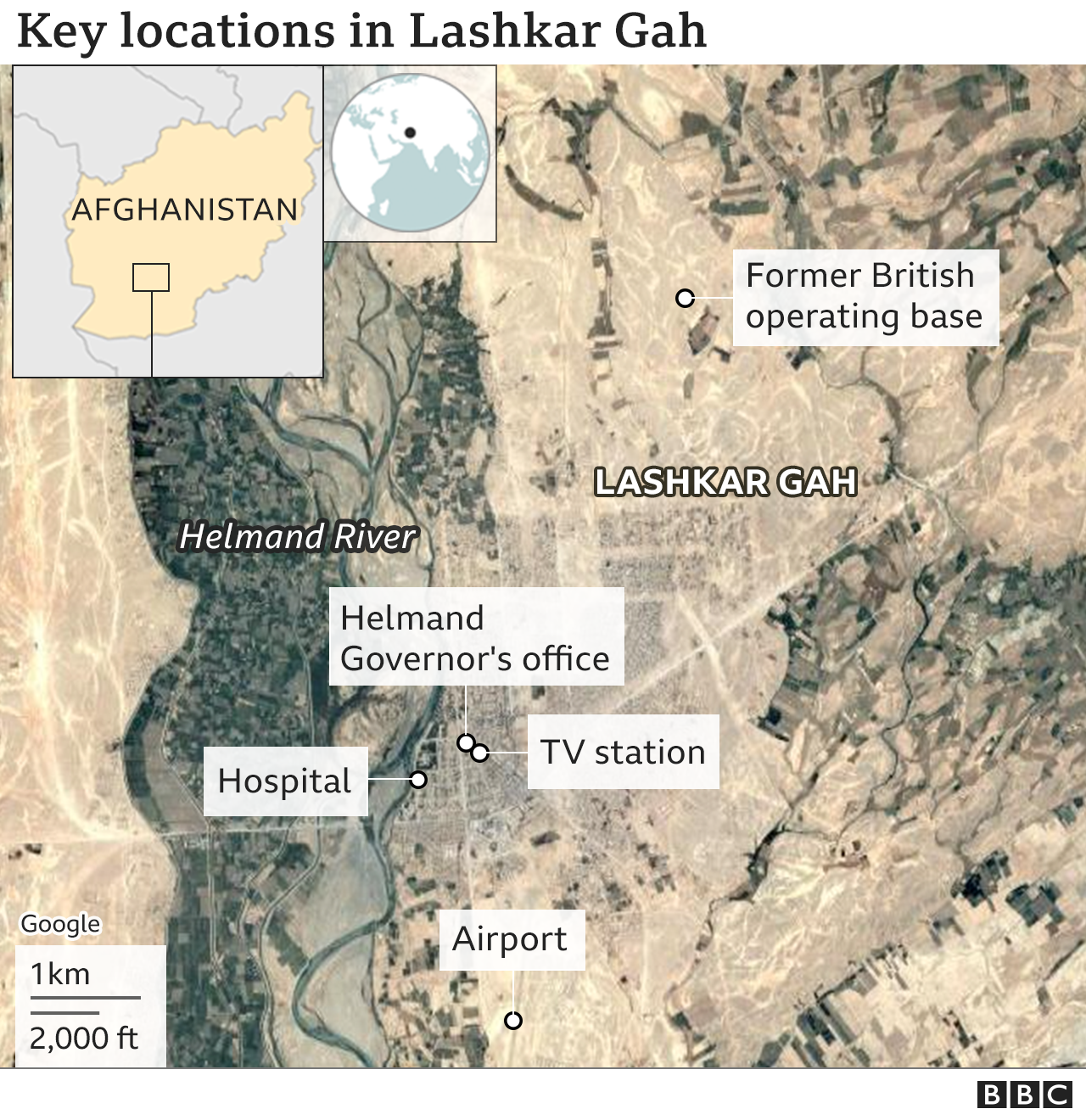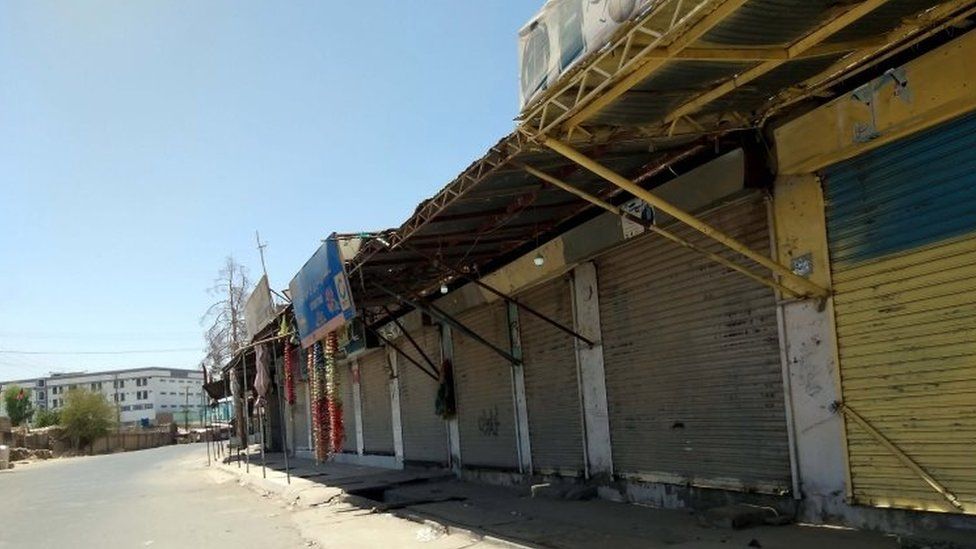“The Taliban will have no mercy on us and the government won’t stop the bombing.”
The resident of Lashkar Gah in southern Afghanistan is one of thousands trapped or fleeing for their lives as fighting for control of the city rages between militants and government forces.
The BBC is not naming some interviewees in this article for security reasons.
“There are corpses on the roads. We do not know if they are civilians or the Taliban,” the man told the BBC Afghan service in an interview on Whatsapp. “Dozens of families have fled their homes and settled near the Helmand river.”
Other terrified locals told the BBC they had seen bodies lying in the streets.
Capturing the Helmand provincial capital would be of huge symbolic value to the insurgents as they continue their rapid advance after the pullout of foreign forces. Helmand was the centrepiece of the US and British military campaign.
The United Nations and other agencies are warning of a worsening humanitarian crisis. At least 40 civilians have been killed in Lashkar Gah in the past day, the UN said on Tuesday.

The Afghan army urged civilians to leave Lashkar Gah ahead of a major offensive against the Taliban, the hardline Islamist group that was driven from power by US-led forces 20 years ago.
Elsewhere in the south, Taliban are trying to capture Kandahar, their former stronghold, and clashes have also intensified in Herat in the west.
Fighting has been going in Lashkar Gah for days, with the militants now reportedly in control of most districts.
“We are going through difficult days,” a student in the city told the BBC. “The Taliban set fire to the ground and government air forces to the skies.”
Another man said on Sunday: “The Taliban can be seen on the city’s roads. The presence of the Taliban has astonished people here.
“Shops are closed, and government military vehicles are lying destroyed in the middle of the road. The war continues within a few metres of the governor’s office and the National Security Directorate.
“The central government said recently they had deployed new commandos to Lashkar Gah, but we didn’t see them.”
Hundreds of Afghan reinforcements have since reportedly been deployed to the city.

At the weekend, Attaullah Afghan, the head of Helmand provincial council, admitted that fighting seemed to be “getting out of our control”.
The Taliban appear to have made further advances this week, despite Afghan and US warplanes targeting the insurgents.
There are reports that Taliban fighters have taken positions inside homes, shops and the bazaar and that people in the city are trapped in their homes while fighting goes street to street.
The militants generally warn people via loudspeaker to leave but sometimes they enter houses – locals have just minutes to flee or risk being caught in crossfire as their homes become part of the battlefield.
“The Taliban told us if we didn’t leave the house in half an hour, we would be counted among the police and Afghan forces,” said the student the BBC Afghan service spoke to.
During their rule in the late 1990s, the Taliban publicly executed people and restricted women’s access to education and employment.
The Taliban say they have changed and would no longer resort to such violence – but many Afghans are sceptical.
Human Rights Watch has documented cases of reprisal attacks by the militants against civilians deemed to have supported the government.
The UN says civilians are bearing the brunt of the conflict and is urging all parties to do more to protect civilians or the impact will be catastrophic.
The thousands who’ve escaped the fighting now face a lack of food, drinking water and medicines.
A doctor in Lashkar Gah, Masood Khan, said an ever-increasing flow of severely wounded patients was arriving at his hospital, and he feared that others were unable to reach it. He said medical supplies were running low.
“We are receiving a lot of war wounded… There is fighting all around,” Dr Kahn, an intensive care specialist at a hospital run by the health charity MSF, told the BBC on Monday.
Videos of reported Taliban atrocities are being shared on social media, deepening fears of their possible return.
The United States and Britain say the group may have committed war crimes, accusing them of massacring dozens of civilians in revenge killings in Spin Boldak, on the border with Pakistan.
There are also reports that at least 40 Hazaras of the Shia Muslim minority were targeted and killed in Malistan in eastern Ghazni province.
The Taliban have dismissed the accusations as baseless, and are posting their own grisly images of civilian casualties in Afghan and US air strikes.

Those trapped in the worsening fighting have few options.
“We have neither bread nor water in the house, and the electricity is completely cut off,” a local businessman in Lashkar Gah told the BBC.
“I do not know where to go, there are clashes in every corner of the city.”
An Afghan interpreter living in the city said his life was under threat from the Taliban because he had worked for the British forces.
“I have changed address three times. My own house has been captured by the Taliban and they are living there and they were asking for me,” he said.
“We don’t know what will happen in the future but they are looking from house to house to find the people who worked for Nato.”



No comments:
Post a Comment
Note: only a member of this blog may post a comment.